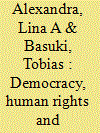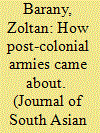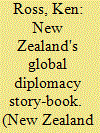|
|
|
Sort Order |
|
|
|
Items / Page
|
|
|
|
|
|
|
| Srl | Item |
| 1 |
ID:
135102


|
|
|
|
|
| Summary/Abstract |
The article documents the evolution of the structural dimension in South Korean foreign policy through a study of middle-power diplomacy in the post-2008 financial crisis period. This article argues that middle-power diplomacy, which propounds a global role for South Korea assuming leadership and substantially increasing international contribution is a paradigm shift in South Korean foreign policy posture, which until recently was limited to issues of the Korean peninsula. Through the middle power discourse South Korea projects its role in international affairs as a facilitator, interlocutor and norm entrepreneur focusing on international security, development and environment and is aims to create a space for Korean diplomatic entrepreneurism in the emerging international order.
|
|
|
|
|
|
|
|
|
|
|
|
|
|
|
|
| 2 |
ID:
136667


|
|
|
|
|
| Summary/Abstract |
After the transition period, the Yudhoyono administration seems to be more confident to craft incorporate human right factor in to foreign policy consideration. Indonesia, under his leadership, has been very much interested to developed the Indonesia’s soft power diplomacy through the effort to promote democracy and human rights values both regionally and globally. In the beginning of his administration, the ministry of foreign affairs has pursued for promotion and protection of human rights as new principle to be observed by ASEAN member states, and later as one of important pillar in developing ASEAN political security community.
|
|
|
|
|
|
|
|
|
|
|
|
|
|
|
|
| 3 |
ID:
134491


|
|
|
|
|
| Summary/Abstract |
What can the scholarship on global international organizations (IOs) tell us about the contributions of the executive head (EH) to organizational change? The empirics of IO studies frequently credit EHs with important changes, but these studies seldom consider EHs separate from the rest of the bureaucracy and thus make few theoretical claims about them. Consequently, it is difficult to assess whether this credit is warranted and why some heads are given more credit than others. This article argues that heads, such as World Bank President Robert McNamara and United Nations Secretary-General Dag Hammarskjold, were influential because they did not just channel state and bureaucratic demands but made political choices that contributed to organizational adaptation. To make this argument, it draws on sociological institutionalist and constructivist scholarship on IO and leadership to develop an analytical framework where IO adaptation is linked to the EH's performance of two tasks commonly associated with executive leadership: defining a strategic plan and mobilizing support to implement that plan. However, it adds that when environmental constraints are severe, the conventional “follower-oriented” mobilization strategies found in leadership studies are less viable. Instead, EHs can adopt an “opposition-oriented” one intended to prevent the opposition from mobilizing while incrementally implementing key reforms.
|
|
|
|
|
|
|
|
|
|
|
|
|
|
|
|
| 4 |
ID:
134244


|
|
|
|
|
| Summary/Abstract |
The creation of an army loyal to the state is one of the most important institutional tasks of post-colonial leaders. But how do novice political leaders develop the capacity to subordinate the armed forces to the authority of state institutions? This essay explains alternative methods of formulating post-colonial civil–military relations and explains why four states – India, Pakistan, Ghana, and Tanzania – took such different routes of institutional development. I make two arguments. Firstly, building armed forces that willingly acquiesce to state authority is always a critical issue of regime change – whether to democracy or some other form of government – though it is more difficult to accomplish in some contexts than others. Secondly, the political and socioeconomic contexts in which armies must be built are very different and thus pose dissimilar challenges and tasks to those crafting new armies and civil–military relations. I will assess the power of several variables to explain the disparate outcomes of the four cases: the quality of political leadership and leaders’ approach to the armed forces, the strength of political institutions, ethno-religious and regional policies, civilian control mechanisms, military–societal relations, and foreign influence.
|
|
|
|
|
|
|
|
|
|
|
|
|
|
|
|
| 5 |
ID:
134925


|
|
|
|
|
| Summary/Abstract |
Our prime ministers have been the most important players projecting New Zealand globally. Of the fifteen prime ministers since 1945, Norman Kirk stands out the most. His inspired branding of New Zealand as a progressive small state, with a deep internationalism central to our national identity, was a pinnacle moment for our global diplomacy. He found for us the global role best suited to our strengths - being a good international citizen. The Kirk branding endures, largely because of his outstanding effort. David Lange, Jim Bolger and Helen Clark have backed his branding with strong support performances. Sir Robert Muldoon and John Key have been the only prime ministers who have not committed wholeheartedly to the Kirk brand.
|
|
|
|
|
|
|
|
|
|
|
|
|
|
|
|
| 6 |
ID:
135333


|
|
|
|
|
| Summary/Abstract |
Since September 11, 2001, Pakistan has pursued seemingly incongruous courses of action in Afghanistan. It has participated in the U.S. and international intervention in Afghanistan at the same time as it has permitted much of the Afghan Taliban's political leadership and many of its military commanders to visit or reside in Pakistani urban centers. This incongruence is all the more puzzling in light of the expansion of indiscriminate and costly violence directed against Islamabad by Pakistani groups affiliated with the Afghan Taliban. Pakistan's policy is the result not only of its enduring rivalry with India but also of historically rooted domestic imbalances and antagonistic relations with successive governments in Afghanistan. Three critical features of the Pakistani political system—the militarized nature of foreign policy making, ties between military institutions and Islamist networks, and the more recent rise of grassroots violence—have contributed to Pakistan's accommodation of the Afghan Taliban. Additionally, mutual suspicion surrounding the contentious Afghanistan-Pakistan border and Islamabad's long record of interference in Afghan politics have continued to divide Kabul and Islamabad, diminishing the prospect of cooperation between the two capitals. These determinants of Pakistan's foreign policy behavior reveal the prospects of and obstacles to resolving the numerous issues of contention that characterize the Afghanistan-Pakistan relationship today.
|
|
|
|
|
|
|
|
|
|
|
|
|
|
|
|
| 7 |
ID:
135270


|
|
|
|
|
| Summary/Abstract |
The economic, political, and social situation in post-2014 Afghanistan remains uncertain, particularly because the effects of the US drawback from Afghanistan on national and regional stability are rather difficult to foresee. In this article, we explore how the debates about post-2014 Afghanistan impact others' thinking. Afghanistan forces national governments and political leaders to reflect deeply on their policies toward Afghanistan and the wider region. Hence, the “Afghanistan problem” becomes a geopolitical imagery within other countries' discourse. Here we scrutinize the impact of post-2014 Afghanistan on South Korean and Chinese foreign policy practices, enabling us also to become familiar with Chinese and South Korean understanding of their political position in Asia.
|
|
|
|
|
|
|
|
|
|
|
|
|
|
|
|
| 8 |
ID:
135792


|
|
|
|
|
| Summary/Abstract |
The paper discusses participation of the public in local councils in Malawi in the context that Malawi has had no councillors since 2005. The paper is based on empirical evidence collected through a largely qualitative research design. It adopts a case study approach focusing on Lilongwe District Council and Balaka Town Council. The study has established that the absence of councillors in Malawi has negatively affected the participation of the public in local public machinery. Analysis of the empirical evidence indicates that in the absence of councillors, (i) local people are detached from councils because of a political leadership vacuum that has been created, (ii) withdrawal of formal policy spaces has culminated in the weakening of voices from below, (iii) power struggles among the actors sitting in for councillors impairs them for motivating people to participate in local public life at the council, and (iv) the interim participatory structures have ended up being patronage oriented rather than community-serving oriented as envisaged. The paper holds the view that, in the absence of councillors, participation in local public affairs is largely limited to the people that are connected to the influential political and social figures and networks.
|
|
|
|
|
|
|
|
|
|
|
|
|
|
|
|
| 9 |
ID:
135464


|
|
|
|
|
| Summary/Abstract |
Rammanohar Lohia (1910-1967) was an unusual politician, who was highly educated, committed to the cause of the common people, and was proud of India with its past glory, religious traditions, ethnic diversity and geographical expanse. He had no hesitation in seating, conversing and sharing his social thoughts and political ideas with young and old, men and women, illiterate and highly accomplished scholars, simplest rural folk and sophisticated literati and, in fact, anybody and everybody. He believed in mass mobilization on the issues of common and public interests and he had no time to relax as long as he was alive. He was a restless soul, who was perennially travelling to distant and difficult parts of the country and sharing lives of the co-workers through the length and breadth of the country. He was a mobile dynamo, who was restless to reach each and every corner of the country with his brand of message for the resurgent India. He was a Gandhian, who did not feel obliged to be imprisoned in the creed of non-violence; he was a proud Hindu, whose life centered around Hindu–Muslim unity; and he was a Hindi zealot, who desired healthy growth of all the Indian languages. He began his political career as a Congressman, but soon gravitated to socialist ideology and remained a diehard socialist till the end. He was one of the founders of the Congress Socialist Party (CSP), Socialist Party (SP), Praja Socialist Party (PSP), and Sanjukta Socialist Party (SSP) of India. He was one of most vocal critics of the Indian National Congress, the ruling party of the newly independent India and its popular Prime Minister, Jawaharlal Nehru.
|
|
|
|
|
|
|
|
|
|
|
|
|
|
|
|
| 10 |
ID:
134932


|
|
|
|
|
| Summary/Abstract |
More than 50 years ago Frank Corner suggested that a 're-discovery of our role in the South Pacific will contribute to the process by which we are regaining our national confidence and re-discovering our unique identity as New Zealanders'. This raises more questions than could possibly be tackled in a review article or indeed by someone whose direct South Pacific experience coincides with the time of Corner's proposition. But how much do New Zealanders know about the countries of the South Pacific outside their availability as tourist destinations and as the home of Pasifika New Zealanders? The tragic 2009 tsunami more than any other recent event brought Samoa to the attention of New Zealanders.
|
|
|
|
|
|
|
|
|
|
|
|
|
|
|
|
| 11 |
ID:
136852


|
|
|
|
|
| Summary/Abstract |
Now world politics is pitched to the spot which had been predicted almost 80 years ago, when no one had imagined that it might be a reality and a defining moment for what we are witnessing today. It is the story of one the most visionary statesmen of 20th Century and leader of India, Subhas Chandra Bose, whom the Japanese government used to address as the president of India, who had outlined the future trajectory of International politics much before the theoreticians of International politics did the homework. According to Bose, Asian integration is the only way to prohibit the European powers.
|
|
|
|
|
|
|
|
|
|
|
|
|
|
|
|
| 12 |
ID:
137103


|
|
|
|
|
| Summary/Abstract |
During the Cold War, U.S. intelligence agencies spared no effort to get tactical and strategic information about Finland and its neighbors in order to route bombers and missiles over Finland, to select targets for nuclear strikes, and to plan coastal landings. Especially during the last years of the Cold War, Finnish military intelligence secretly channeled information to the Americans without notifying Finland’s political leadership. Washington gave the Finns military information on Soviet bloc countries on a quid pro quo basis. Although Finland was bound to the Soviet Union by a friendship treaty of a military nature, it seems that the Finnish armed forces actually were prepared to fight the Soviets alongside the West.
|
|
|
|
|
|
|
|
|
|
|
|
|
|
|
|
|
|
|
|
|